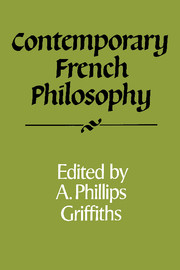Book contents
- Frontmatter
- Contents
- Preface
- Continental Insularity: Contemporary French Analytical Philosophy
- The Misprision of Pragmatics: Conceptions of Language in Contemporary French Philosophy
- Ants and Women, or Philosophy without Borders
- Motifs towards a Poetics
- The Relevance of Cartesianism
- The Enlightenment without the Critique: A Word on Michel Serres' Philosophy
- The Teleological and Deontological Structures of Action: Aristotle and/or Kant?
- The Crisis of the Post-modern Image
- Merleau-Ponty and the Phenomenology of Perception
- Epistemological History: The Legacy of Bachelard and Canguilhem
- History as Genealogy: An Exploration of Foucault's Approach to History
- Beyond Deconstruction?
- Further Adventures of the Dialectic: Merleau-Ponty, Sartre, Althusser
- Paradoxes of the Pineal: From Descartes to Georges Bataille
- Notes on Contributors
- Index
Beyond Deconstruction?
Published online by Cambridge University Press: 25 May 2010
- Frontmatter
- Contents
- Preface
- Continental Insularity: Contemporary French Analytical Philosophy
- The Misprision of Pragmatics: Conceptions of Language in Contemporary French Philosophy
- Ants and Women, or Philosophy without Borders
- Motifs towards a Poetics
- The Relevance of Cartesianism
- The Enlightenment without the Critique: A Word on Michel Serres' Philosophy
- The Teleological and Deontological Structures of Action: Aristotle and/or Kant?
- The Crisis of the Post-modern Image
- Merleau-Ponty and the Phenomenology of Perception
- Epistemological History: The Legacy of Bachelard and Canguilhem
- History as Genealogy: An Exploration of Foucault's Approach to History
- Beyond Deconstruction?
- Further Adventures of the Dialectic: Merleau-Ponty, Sartre, Althusser
- Paradoxes of the Pineal: From Descartes to Georges Bataille
- Notes on Contributors
- Index
Summary
There are many people who think that deconstruction has run its course, has had its day, and that it is now time to return to the important business of philosophy, or perhaps to serious ethical, social and political questions. Derrida's work, it is said, leads nowhere but a sterile philosophy of difference that in its de-politicized, de-historicized abstractness is a form of conservatism little better than the kinds of identity thinking to which it seems to be so radically opposed. In short, we must go ‘beyond’ deconstruction.
But ‘beyond deconstruction’, is a bit like ‘Hegel aufgehoben’. Deconstruction was born from and sustains itself in a meditation on the limits of philosophy. Derrida has made a speciality of diagnosing metaphysical residues in the thought of those who sought passionately to eliminate them, and pronounced this inevitable even for his own (and our own) thought. Deconstruction represents the most sophisticated attempt to deal with the question successively posed by Kant, Hegel, Nietzsche, Husserl and Heidegger—that of the end of metaphysics. I shall argue is that there is no royal road through or round Derrida or deconstruction, and that a serious confrontation with it makes the value of going ‘beyond’ it problematic.
Ten years ago the situation was different. Heraclitus put it well when he said that dogs bark at what they do not recognize. Now the dogs have stopped barking, sniffed cautiously, and turned tail.
- Type
- Chapter
- Information
- Contemporary French Philosophy , pp. 175 - 194Publisher: Cambridge University PressPrint publication year: 1989

